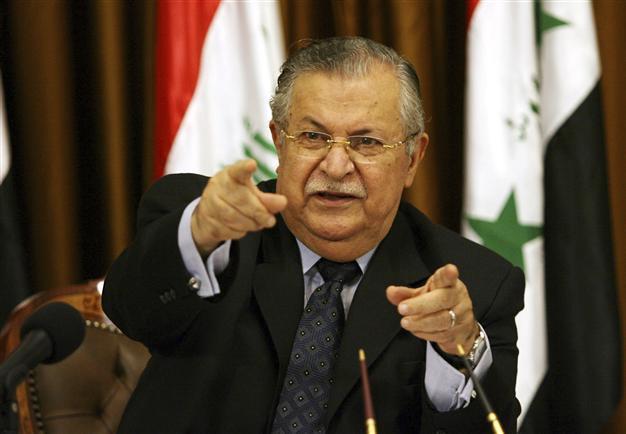Iraq president to go to Germany for treatment
BAGHDAD - Agence France-Presse

In this Aug 17, 2007 file photo, Iraq's President Jalal Talabani talks to reporters in Baghdad, Iraq. The office of Iraqi President Jalal Talabani said Tuesday he has been admitted to the hospital for treatment of an unspecified health problem.. (AP Photo/Hadi Mizban, File)
Iraq's ailing President Jalal Talabani will be transferred to Germany for further treatment after an emergency that saw him hospitalised in Baghdad, a doctor and an official said on Wednesday."The president's condition is improving, and he will be transferred to a hospital in Germany tomorrow," Najm al-Din Karim, one of Talabani's doctors, told AFP.
And Barzan Sheikh Othman, the top media official in Talabani's office, said teams of doctors from Iraq, Germany and Britain decided that the president should be transferred to Germany to receive further treatment.
Iraq president 'improving' in hospital: doctor
President Jalal Talabani, a key figure in Iraqi politics for nearly half a century who has sought to bridge the country's divides, was showing "improvement" in hospital on Wednesday, a doctor said.
"Tests showed the stability and improvement of his excellency's health condition," said Dr Hani Mussa Badr, the director general of Baghdad's Medical City hospital, where Talabani is being treated.
Deputy Health Minister Issam Namiq meanwhile told the news conference that both Iran and Germany have sent medical teams to assist with Talabani's treatment, and that a British team was to arrive by midday.
Talabani was admitted to hospital late on Monday after an emergency that state television reported was a stroke.
A statement from his office on Tuesday said that "bodily functions are normal and the health condition of his excellency the president is stable." It said the emergency was due to hardening of his arteries.
Under Iraq's constitution, "the vice president" takes over if the post of president becomes vacant for any reason, and that a new president must be elected by parliament within 30 days.
Vice President Khudayr al-Khuzaie would apparently be the one to temporarily take charge if Talabani dies, both by virtue of being the senior of Iraq's two vice presidents, and because the other, Tareq al-Hashemi, is a fugitive who has been handed multiple death sentences for charges including murder.
Talabani has struggled with a series of health problems in recent years.
He underwent successful heart surgery in the United States in August 2008. The previous year, he was evacuated to neighbouring Jordan for treatment for dehydration and exhaustion.
Talabani has also travelled to the United States and to Europe for treatment for a variety of ailments.
Talabani has been a key figure in Iraqi politics for decades, first as a Kurdish rebel and political leader, and later as the president of Iraq, a post he took up in 2005.
Since becoming president, he has won praise for attempting to bridge divisions between Sunni and Shiite, and Arab and Kurdish factions.
And over the past year, he has repeatedly sought to convene a national conference aimed at bridging sharp political differences in the country, and worked to reduce tensions among Iraqi leaders.
A married father of two, he has dominated Iraqi Kurdish political life for decades, along with his long-time rival, Kurdistan regional president Massud Barzani, and his family.
After studying law at Baghdad University and a stint in the army, Talabani, who was born in 1933, joined the Kurdistan Democratic Party (KDP) of Mullah Mustafa Barzani, father of Massud, and took to the hills in a first uprising against the Iraqi government in 1961.
But he famously fell out with Barzani, who sued for peace with Baghdad -- the start of a long and costly internecine feud among Iraqi Kurds.
Talabani joined a KDP splinter faction in 1964, and 11 years later established the Patriotic Union of Kurdistan (PUK).
The two Kurdish rebel factions were both key allies of the US-led coalition in its 2003 invasion and overthrow of now-executed dictator Saddam Hussein's regime.
In his native Sulaimaniyah province, Talabani is known simply as Mam (Uncle) Jalal, although his once ubiquitous political support has dropped off considerably as the PUK has been accused of corruption and stagnation.
















